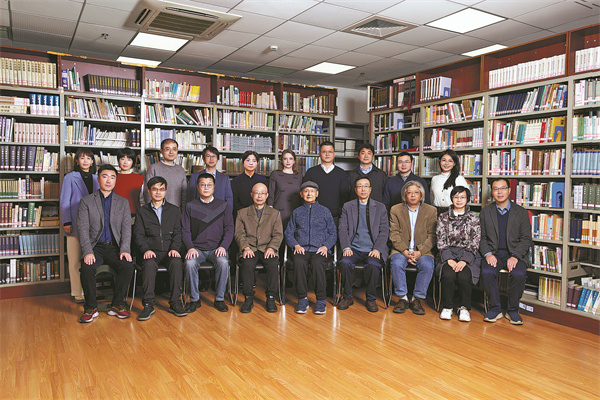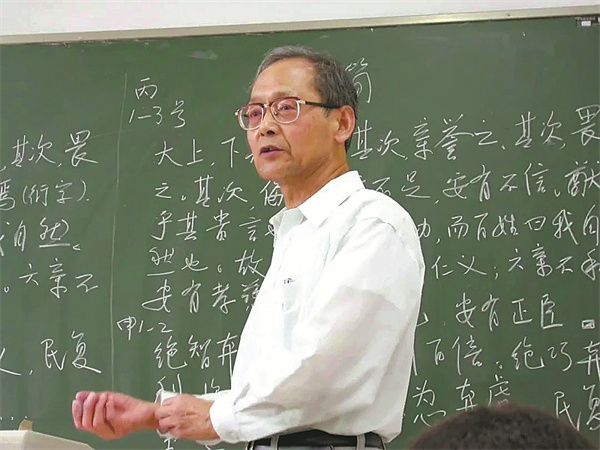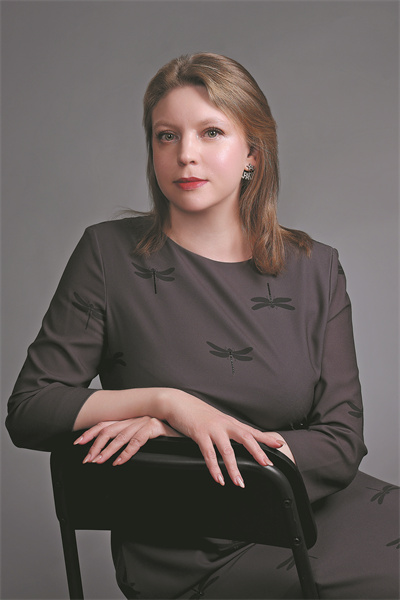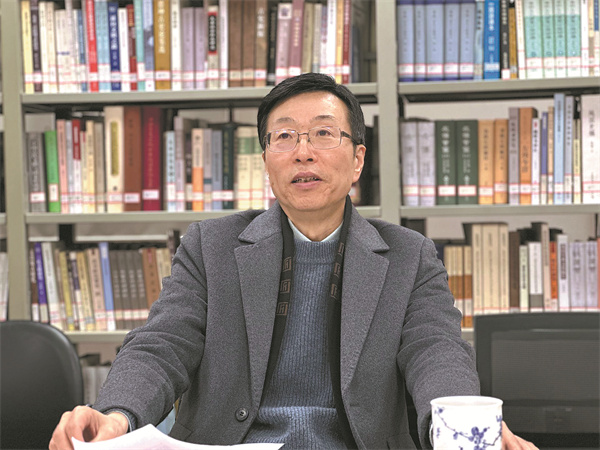

Members of the Center for Research on Chinese Excavated Classics and Paleography at Fudan University.[Photo provided to China Daily]
Some names are synonymous with a particular field. Such is the case for Chinese paleographer Qiu Xigui.
At 90, he maintains a heavy workload, burying himself relentlessly in decoding the mysteries of ancient Chinese civilization.
Born in 1935 in Shanghai, Qiu is highly accomplished and renowned in various disciplines including paleography, ancient classics, history and linguistics. Dubbed "the top researcher of contemporary Chinese paleography", he has made remarkable academic achievements in diverse categories such as research on the inscriptions on oracle bones, bronze objects, in the Warring States Period (475-221 BC), bamboo and wood slips, and silk manuscripts.
Yet, Qiu is not alone on this long, long journey. This legendary paleographer has influenced and inspired countless peers and younger scholars with his unchanging passion, devotion and commitment to paleography. He has also been the academic core at the Center for Research on Chinese Excavated Classics and Paleography at Fudan University, which he launched in 2005 and celebrated its 20th anniversary recently.
Paleography and research on excavated classics basically refer to the study of ancient writings and inscriptions based on ancient written materials, especially those excavated. It also involves the deciphering and interpretation of the ancient writing systems, language, classics and history. It is regarded as a little-known subject due to its high entry threshold, long training process and difficulty in getting results.
However, despite all the challenges, paleography continues to unlock the mysteries of ancient civilizations. Liu Zhao, head of the center, says: "If we would like to tell clearly about the 5,000-year Chinese civilization and better tell China's stories, paleography and research on excavated classics are extremely important. The ancient writings are not only characters, but reflect people's life, thoughts and wisdom in ancient times. Without (ancient) writings, our understanding about the ancient times would be like walking through an endless night".
Qiu, together with other 16 researchers at the center, is the torchbearer who leads the way and lightens the path through the "night". Despite increasing age and eye disease, Qiu is still working several hours a day, devoting himself constantly to the annotation project on the Tao Te Ching, a philosophy book by Lao Tzu.
Following Qiu's relentless drive, over the past two decades, the center has reaped fruitful achievements in various aspects including interpreting ancient writings, organizing excavated ancient classics and tracking the development of Chinese characters, receiving over 60 major awards.
One of the center's signature achievements was a collection of Mawangdui bamboo slips and silk manuscripts published in 2014 with its amended version published last year. Also last year, a three-book tutorial on the excavated classics and paleography compiled by the center was published, the first of its kind for postgraduate students in China.

Renowned Chinese paleographer Qiu Xigui.[Photo provided to China Daily]
International appeal
With such remarkable achievements, the center has earned a stellar reputation in the academic world both at home and abroad, attracting brilliant researchers from across the world over the past two decades. Overseas scholars from countries such as the United States, the United Kingdom, Japan, Singapore and France, continue to visit the center for academic communication and cooperation. And Olesia Volkova, a Russian researcher, became a new team member at the center two years ago.
Volkova started her life at Fudan University as a PhD student in 2015.In 2019, she obtained her degree from the center. In 2023, she returned to Fudan to join the center and to continue her comparative project on early writing. Her current research focuses on areas and eras of antiquity that witnessed the emergence of writing: Ancient Egypt, Mesopotamia, Early China, and Ancient Mesoamerica.
"I have been living in China for several years. In a distant past, this land gave birth to a distinctive, and in many ways unique, culture. All these years I have been studying the earliest excavated texts — inscriptions written on bone and bronze vessels during the later period of the Shang Dynasty (c. 16th century-11th century BC), or 1230-1045 BC.These inscriptions are valuable sources of early Chinese thought in their own right. But at the same time, they reveal remarkable cross-cultural similarities that remind us about a shared nature of human society, and they are, indeed, worth reconsidering under a comparative perspective", says Volkova.
She points out that the early civilizations have traditionally been viewed as entities separated from the rest of the ancient world. However, recent archaeological work provides a quite different picture: The early civilizations did interact with neighboring societies and remote lands. And it is not surprising that a cross-cultural comparison has already become a trend in such fields as ancient history, archaeology and anthropology.
"The invention of writing remains one of the many unsolved mysteries of humanity. Our present knowledge of how writing was created in China, or elsewhere in the ancient world, is still far from clear. The surviving archaeological materials from the beginnings of civilization (in each of the four areas of the ancient world) are not enough to answer the question of where and when writing was invented", she adds.
At the center, Volkova is always surrounded by support and enjoys sharing ideas with her colleagues. She believes that this process itself is fundamental for her personal and professional growth, and hopes that one day she will share what she has learned from the center with her colleagues and friends in Russia.

Olesia Volkova, a Russian researcher at the Center for Research on Chinese Excavated Classics and Paleography at Fudan University.[Photo provided to China Daily]
For the future
"We are in good times", says Liu excitedly, adding that the "spring" for research on ancient Chinese writings has come, and the boom will probably last for decades as the nation places increasing emphasis on paleography, archaeology and ancient classics in recent years.
Liu notes that the outstanding Chinese traditional culture is the main spiritual source and pillar to enhance Chinese people's cultural confidence. With the development and application of advanced technologies such as the high-definition photos, 3D printing, DNA testing and especially artificial intelligence, the paleography studies will see further and continuous progress as it gets more segmented, systematic and digitalized.
The research on oracle bone inscriptions is benefiting from technological advances. At present, there are some 160,000 pieces of oracle bones scattered across the world, and the correct rejoining of these pieces has been a major challenge for researchers. However, the application of AI has brought a new light into this sector, generating more possibilities and greatly improving efficiency. To date, recognized rejoined oracle bone pieces have exceeded 7,000, among which over 500 were made by the center's researcher Jiang Yubin, with another more than 400 made by the center's post-1990s PhD student Yang Yi.

Liu Zhao, head of the Center for Research on Chinese Excavated Classics and Paleography at Fudan University.[Photo provided to China Daily]
Yang is one of the more than 60 students pursuing a degree at the center. Previously, over 140 Master's and Doctor's degree candidates have graduated from the center, continuing to contribute their efforts as scholars and teachers in schools, editors in publishing houses, museum researchers and even government officials.
With the rising public awareness and attention on outstanding traditional Chinese culture, Liu is pleased to see an increasing number of young people are getting interested in this subject in recent years. Impelled and inspired by Qiu, both teachers and students at the center have been sticking to a similar academic style over generations, which is to be strict with themselves, concentrate and devote true efforts relentlessly to be a "pure" scholar.
"Comparing with figuring out specific characters and words, it can be more difficult and a longer-term work to interpret the ideas and thoughts of the ancient contexts. Also, as times change, we need to constantly give fresh meanings of them to cater to the current situations. We look forward to more young people with passion in paleography, especially interdisciplinary talents, joining us for the future", says Liu.
(END)
Source: China Daily